Hello,
These cases often arise in my practice. Hears how I address them. I present my findings of the physical exam to my client and discuss recommendations and suggestions to provide the best care possible. Ideally all cats with heart murmurs should have echocardiograms Especially before anesthesia. But based on a cost of about $600 most people decline to do it. It doesn’t change the need for removing the polyp so we typically do the procedure with as many precautions as possible but not knowing everything we would like to because we don’t have the heart scan to know what’s going on in that department. We veterinarians want all of our patients to be as safe and receive the best care possible. But in a lot of cases this isn’t feasible so we do the best we can knowing that we don’t have all the information we would like. Talk to your vet and find the place everyone is comfortable. If you have a bet that isn’t willing to work with you based on budget or diagnostics ask for a referral or seek a second opinion.
I have a semi domestic cat with maggots at its tail on uper body. It’s not completely a house cat and can be very aggressive when in pain. Lives mostly in parks in front of my house. I want it help but vets are all closed due the covid 19 lockdown. And the infestation of maggot is really bad. There are 3 wounds on its tail.
I need some tips to sedate it at home so that I can treat it. Any tips?
Comments
My vet thinks my cat has a nasopharyngeal polyp but he needs to go under anesthesia so he they can know for sure and get it out, but he was also listening to my cats heart and said he has a grade one mitral heart murmur and that he needs to have xrays and ultrasounds and such done to make sure his heart is ok before going into surgery because they said his heart could fail while under anesthesia and he could die. My dad said they we should just go ahead with the surgery without spending $550 extra dollars because he doesn’t think he has anything serious wrong his heart considering it was only a grade one heart murmur and my cat was already very nervous about the car ride and being at the vet and that could have caused his heart rate to be off a little. Would it be necessary to look into his heart further or just go ahead with the surgery considering it would only be a 20-60 minute surgery? Would a cat with any type of heart conditions die during surgery? What should I do next?
Comments
IVDD – Beagle
My 9 year old beagle is displaying symptoms of IVDD. Currently he is still able to walk. He holds up a paw when he stands but does have pain in the neck area. He has been displaying these symptoms for a month. This is the third times he has had issues with this leg which we always assumed was so sort of sprain and was helped by rest. The nuroligst wanted to do an emergency MRI and possible surgery if the MRI confirmed IVDD. However, his symptoms don’t seem nearly as bad as other have expressed. Is surgery really the way to go if I can afford it to help him heal the quickest? I want him to heal as quickly as possible, but I am nervous that the surgery seems risky. Any advice?
Comments
Hi there. My dog Ruby had sudden onset Mast Cell Tumors present about 3 weeks ago. She’s an energetic 4 year old pit/great dane mix (I know because I spent a billion dollars on a DNA kit). I noticed about 7 subcutaneous lumps on her left side while she was outside playing. They felt like little oblong marbles under her skin. Our vet is an hour away. We had moved a few months back and kept our vet because we love him so much. We still see him for routine care. There is a vet very close to our home and I have read good reviews and have had email conversation previously when I was deciding whether or not to switch vets. I was concerned Ruby would have cancer, I just felt it, and didn’t want her to have to make several long trips to our vet if she were to require surgery, etc. So I decided to take her to the new close to home vet. As it is Covid-19 season, I did not get to go inside the vet’s office with her. They aspirated one of the lumps and were concerned. She was scheduled for surgery in the following week. I talked to my other vet about this, and he was not pleased to hear they aspirated her, because he was worried that the histamines from the tumor would cause it to spread. I was alarmed and researched Dr. Google for 2 days. It seemed to me after my research that the aspiration was standard course of care. Ruby had her surgery and had 2 large masses removed. They could not take all of them because there would have been too many incision sites. Directions for care included keeping her inactive for 10-14 days, not an easy dear with an anxious 65 lb lap dog. On day 7 of recovery, I noticed a fluid buildup around the incision site. Back to Dr. Google, I decided she had a seroma. I called the vet the next morning and we took her over and my suspicion was confirmed. They told us to call if it got worse. We still haven’t received the pathology back on the two masses that were removed. This morning I decided I needed to do more research, as two new masses have cropped up (the tumors, not seroma). Ruby is in good spirits and just wants to play and run with our other dogs. She’s mad at me, I’m sure of it, for making her lay around all day. Is it normal to have a seroma after surgery? Why do these tumors pop up all of a sudden?
Hello. I am hoping Dr. Magnifico sees this message as she treated Samantha yesterday (Friday) for me.
She has found a quiet hiding place and I am able to pet her although she is not thrilled….turns her head. I have not seen her eat but I cannot rule it out because she may come out when we are asleep.
Do you think she could be in any pain? If not okay but if you do I have a syringe of 5 ml buprenorphine that was for Dexter but he did not need
It. I did not want to do anything without asking you. If you think it would help could I give her the med?
Another question. One if my other cats was diagnosed with probable lymphoma. I mentioned on Wednesday (I think it was Wednesday) that she had been sneezing from time to time but it was recommended that we hold off because we were already dealing with something major unless it got worse. She is doing it more frequently and seems to effect her purring. There is a good chance I may bring her in tomorrow to see you.
Thanks
Sandy
If you are reading this I want you to know that I truly appreciate you helping us out at the last minute yesterday because of my stupidity.
Comments
Hello! I have been a follower for a couple of years and you helped me to not give up hope when my 15 year old dachshund suffered from cervical IVDD in October….he was completely paralyzed for 1 month and is mostly back to his rambunctious self. Thank you!!
I do have a question. I am currently fostering an old lady chihuahua who has red eyes. I was wondering if you had come across it or have any resources I could use? She does not have conjunctivitis. She sees well, but does appear to startle if we move too quickly. It appears that the cornea and iris are red…like that of a hamster or rat. There is not really any pupil distinction, however, it does not seem as though she suffers from light sensitivity. Thank you for any information that you can provide.
Comments
My cat has had diarrhea for 3 days. What should I do for him? Should I take him to the vet?
Comments
Hi,
Last April, my 16-year-old long haired cat, Geisha, began experiencing frequent sneezing and congestion. Her symptoms worsened gradually. Her nasal breathing sounded wheezy and her purring sounded like duck quacking. We took her to the vet who treated her with antibiotics (Amoxicillin) and anti-histamine (Chlorpheniramine). When her symptoms did not improve, the vet then gave her a different antibiotic (Convenia) and a steroid (Dexamethasone). When her symptoms still did not improve, we took her to a specialist. The specialist ruled out rhinitis because Geisha’s bloody nasal discharge only occurred from her right nostril and concluded that Geisha possibly had a polyp or nasal tumor. They recommended performing a CT scan, rhinoscopy, and biopsy. They prescribed Geisha a steroid (Prednisolone) while we thought over their recommendations. Within a day, Geisha’s symptoms began to dissipate and after a couple of days, all her symptoms disappeared and she was fully recovered.
Unfortunately, in January of this year, Geisha had another relapse of the same symptoms. We brought her to the vet on 1/9/2020, who after hearing her previous history, prescribed both Clavamox and Prednisolone. They also administered a blood test, the result of which we were told was unremarkable.
Geisha’s recovery last year came after she was put on 1 tablet of 5mg Prednisolone per day. Unfortunately, the same medication regimen this time did not improve her condition. After weeks on medication with no signs of improvement, on 3/6/2020, we brought Geisha to a specialist referred by the vet. There she was given another blood test, the results of which was once again deemed unremarkable. During the same visit, we were told that only a CT scan along with a biopsy would conclusively identify the root cause of her symptoms. We agreed to the CT scan on this basis alone.
After spending close to $2,500 on the scan, we were told that the CT scan did indicate a mass but that the nature and identity of the mass could not be determined. The specialist informed us that the biopsy results did not indicate that the mass was cancerous. However, he stated that it is his opinion that the mass was cancerous, without any supporting evidence and despite the contradictory biopsy results. It is his opinion that the biopsy results are incorrect due to poor sampling. His conclusion is that we should consider pursuing radiation treatment since that would be the only resolution. So, basically, after a $2,500 expense, the vet is just as clueless about the nature of Geisha’s issue as he was before.
Geisha was returned to us after the CT scan with Prednisolone medication. We were instructed to increase her dosage to 1.5 5mg Prednisolone per day. With this increased dosage, Geisha’s condition has improved. In the month that has passed, while her condition has improved, she is still mildly symptomatic and not fully recovered and thus is still on the same medication regimen.
Naturally, my wife and I are very disappointed that we still have an inconclusive diagnosis despite having been assured that the costly procedures would be justified by the precise root cause that they would deliver. We also don’t understand why we spent money for procedures such as the biopsy only for the vet to completely disregard the results and formulate his opinion purely on conjecture. This all seems to fly in the face of the scientific method that all science is based on.
I would love to get your opinion on what you think is the issue with Geisha and what you believe the best course of action for her is based on her past year of symptoms and treatment history and also taking her age into account.
Thank you so much for your time.
Comments
I am in obx and I have been looking for help with my dog . I have saw your blog and your videos on you tube and wanted to reach out to you. My dog might have disc disease . She is in a hospital on another island down here . Actually it is my grandsons dog, he lives with me alone and this has been his best friend for 4 years . He is 11 and we adopted her . She woke up Monday and her back legs were shaky and then we took her to hospital and she has been there ever since . They have treated her with meds incase it was a bacteria or tick disease but she still can’t use her back legs. She still can’t stand . She is still in vets resting and getting great care. We don’t have much money so we can’t get her an mri but I grew up near jarretsville(went to John Carroll high) and when I saw your blog and video I thought maybe you could give us some advice. Can we email you? My email is Marygrace58@aol.com . I thank you so much! The vet here is so awesome and still gives us hope! but they are saying I might want to consider putting her down. Which I understand but I saw your videos and thought I might reach out. My grandson wants to bring her home but she can’t walk and use bathroom. Was hoping you could give us some help or advice. I just called up to your office because I was hoping to talk to you. The lady that answered the phone said this was the best way to contact you. My phone is 804 814 5068. I do not want to put the dog down. I would like to try and would like some ideas from you. Thank you for your time. Marygrace and AJ






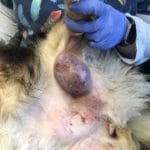

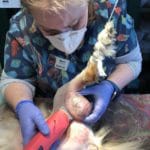
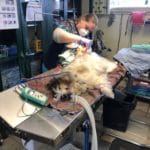

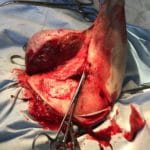
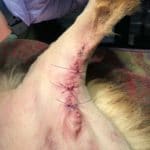
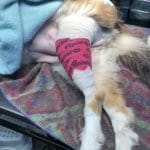



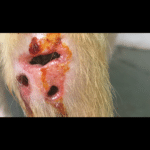
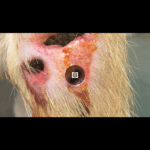
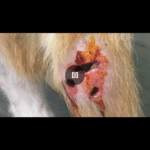
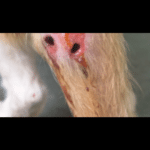


Hello,
I’m so sorry to hear about your cat.
All vet clinics in the us are open to emergencies. This is an emergency. Please call and explain what is going on and have your cat seen.
Can I apply Ivermectin on the wound to kill the maggots? Or turpentine oil is better?
Our vet remains open as well as those in the surrounding area. I would call around to find a vet as h this is an emergency.
I don’t live in the us. I live in India. I’ll post u a picture of its condition soon after it returns. It goes in the park at night.
Can I apply Ivermectin on the wound to kill the maggots? Or turpentine oil is better
This needs to be seen by a vet. If you are unable or unwilling there are videos on YouTube on flushing them out. I cannot offer advice on how to safely sedate. A vet needs to be contacted for that. It’s too dangerous to attempt at home. Also there are products available that have been used in rescue for many years to help. I have known rescuers to use capstar. In the USA it is available over the counter.
I have seen many videos on youtube and have been doing some research since yesterday when I found out about it. Unfortunately catstar is not available at shops. Most suggestions on net I found are of ivermectin or turpentine oil. I am just confused between the 2? I have bought both and will start the treatment soon as he comes back.